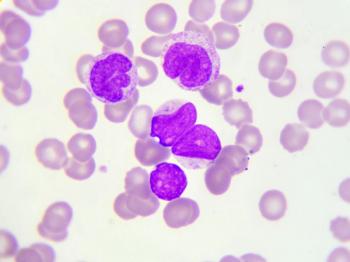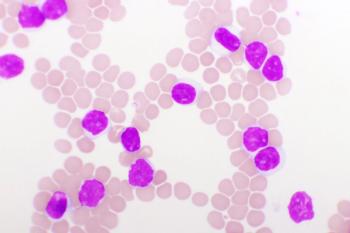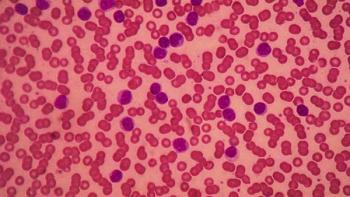
Investigators suggest that results of a study may help to identify concerns of individuals undergoing panel testing and ways to support their needs.

Your AI-Trained Oncology Knowledge Connection!


Investigators suggest that results of a study may help to identify concerns of individuals undergoing panel testing and ways to support their needs.

The chief of urologic oncology at City of Hope spoke about how the COVID-19 pandemic has altered the way he cares for patients with cancer as well as how he believes it will continue to impact cancer prevention, detection, and treatment moving forward.

The combination of palbociclib and endocrine therapy demonstrated a more favorable safety profile and improved quality of life versus capecitabine among patients with metastatic breast cancer who were resistant to aromatase inhibitors, despite not improving progression-free survival.

Tisagenlecleucel has already received FDA approval and is now available at some treatment centers, thereby imparting significance to results about tocilizumab use in patients at-risk for severe cytokine release syndrome.

A study of capivasertib plus chemotherapy did show a statistically significant extension in overall survival despite not reaching the primary end point of progression-free survival, suggesting a need for prospective validation studies to determine the reasoning behind the observed differences in these results.

Based on findings from a study looking at niraparib plus cytotoxic agents, investigators have commenced a combination study of the niraparib plus temozolomide and irinotecan triplet in patients with pretreated Ewing sarcoma.

The approval of umbralisib was primarily based on data from the marginal zone lymphoma and follicular lymphoma patient cohorts of the phase 2b UNITY-NHL trial.

Results from the phase 3 SOPHIA trial demonstrated that margetuximab plus chemotherapy had an acceptable safety profile which was comparable to that observed with trastuzumab plus chemotherapy.

The phase 3 KESTREL trial demonstrated that combination treatment with durvalumab plus tremelimumab did not display an overall survival benefit in “all-comer” patients with metastatic head and neck squamous cell carcinoma versus the EXTREME regimen.

With an estimated 2.3 million new cases identified, the Global Cancer Statistics 2020 report indicated female breast cancer was the most commonly diagnosed cancer type.

“MRD status after both induction therapy and consolidation therapy showed prognostic value. This may provide information for deciding timing of MRD assessment,” wrote the study investigators.

“As the current work is the largest ever published on adjuvant [fluoropyrimidine; FP] for patients with MSI stage III [colon cancer], it suggests that FP alone should not be recommended as adjuvant treatment for these patients,” wrote the study authors, who were led by Romain Cohen, MD, PhD.

When also considering age and Rai score, the effect of Charlson comorbidity index score on mortality was found to be statistically nonsignificant for patients with chronic lymphocytic leukemia, although higher scores were associated with worse overall and relative survival.

Investigators suggested that findings across different clinics can help inform future implementation of the Colorectal Cancer Control Program (CRCCP).

The urologist at Dana-Farber Cancer Institute/Brigham and Women’s Cancer Center spoke about the impact of a decline in cancer screening tests being performed during the first wave of the pandemic.

According to the study authors, an end-to-end deep learning approach to generate CT-based biomarkers may help produce more rapid clinical translation.

To evaluate the association between radiation facility case volume and OS among men with lymph node–positive prostate cancer who receive external beam radiation therapy, this cohort study assessed men diagnosed with T1N1M0 to T4N1M0 disease treated with curative-intent radiotherapy and androgen deprivation therapy.

Based on the results of an analysis, investigators suggested that if high-dose daunorubicin and cytarabine is the selected consolidation treatment for younger patients with acute myeloid leukemia, a fourth course of therapy is likely beneficial for most.

Bellicum Pharmaceuticals, the developer of BPX-601, can now begin enrolling patients to their phase 1/2 trial again without modification to the study protocol.

This ongoing study supports the continued development of AXL inhibition with bemcentinib in order to extend the efficacy of immunotherapy in biomarker-selected refractory non—small cell lung cancer, according to Matthew G. Krebs, MB ChB, FRCP, PhD.

The associate professor of Thoracic/Head & Neck Medical Oncology at The University of Texas MD Anderson Cancer Center indicated that these data provide the first avenue for personalized treatment of small cell lung cancer.

The phase 3 RATIONALE 302 trial demonstrated that compared to chemotherapy, tislelizumab showed a statistically significant and clinically meaningful improvement in overall survival in the intention-to-treat population of patients with advanced or metastatic esophageal squamous cell carcinoma.

Following phase 2 success, the FDA provided Bioniz Therapeutics with guidance for the design of a phase 3 trial of BNZ-1 in patients with relapsed or refractory cutaneous T-cell lymphoma.

During the age of systemic immunotherapy, investigators observed a change in the incidence of second primary cancers after metastatic melanoma that included solid tumor and hematologic malignancies.

Investigators found that the number of metastatic lymph nodes and the presence of extranodal extension are complementary for predicting disease-specific survival in head and neck squamous cell carcinoma, suggesting the necessity of incorporating these factors into staging systems.

Though previous reports have suggested that an EGFR tyrosine kinase inhibitor plus an anti-VEGF agent might offer benefit to patients with brain metastasis or pleural effusion, the study authors could not identify its advantage.

Overall, the phase 3 ELEVATE-RR trial demonstrated efficacy of acalabrutinib and a safety and tolerability profile that with was consistent with that observed in the broader acalabrutinib clinical development program.

Investigators suggested that the results of this study may assist health care providers in personalized therapeutic regimen selections for patients with early-stage breast cancer.

The BLA submission is based on data observed in the phase 2 POD1UM-202 trial of retifanlimab in previously treated patients with locally advanced or metastatic squamous cell carcinoma of the anal canal who had progressed on, or were intolerant of, standard platinum-based chemotherapy.

The novel viral immunotherapy PVSRIPO is designed to stimulate a patient’s innate and adaptive immune system to promote an antitumor response and establish long-term immunologic memory to help keep their cancer at bay.